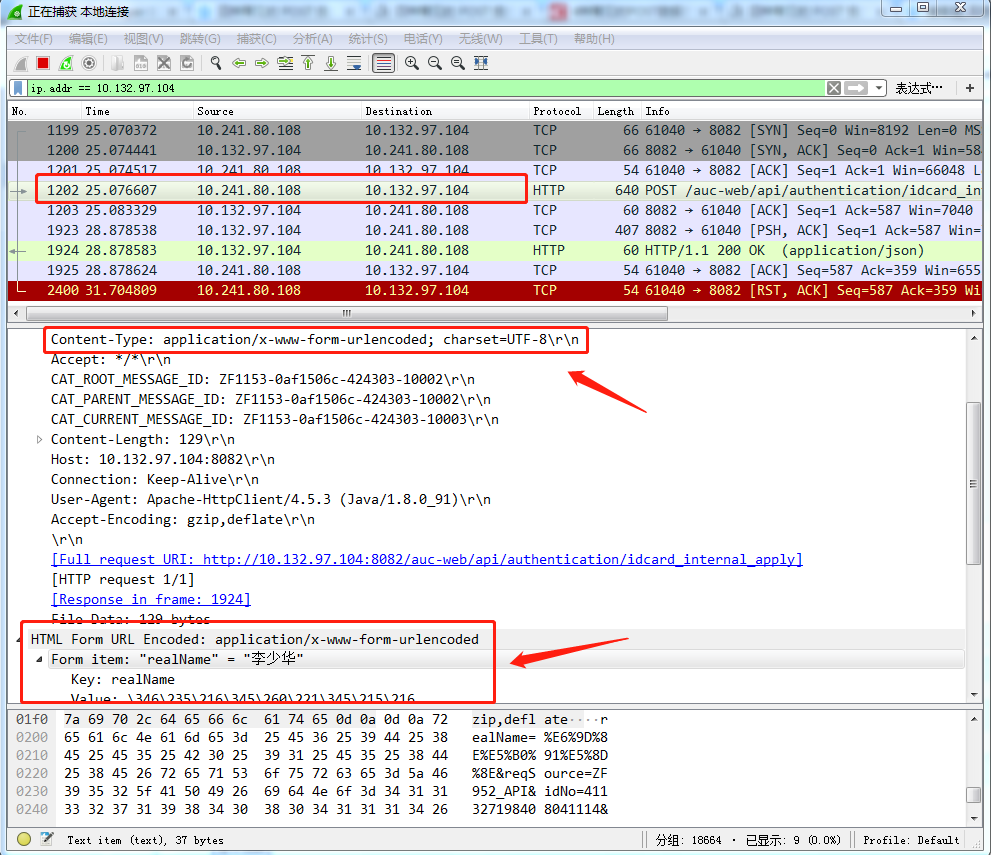Form表单的POST提交,调用该类接口最长用的方式就是HttpClient,如果使用Feign,如何实现呢?
首先,看下Http中已Form的形式做Post提交的定义:
-----------------------------------华丽的分割线------------------------------------------
POST提交
HTTP 协议是以 ASCII 码传输,建立在 TCP/IP 协议之上的应用层规范。规范把 HTTP 请求分为三个部分:状态行、请求头、消息主体。类似于下面这样:
<method> <request-URL> <version> <headers> <entity-body>
协议规定 POST 提交的数据必须放在消息主体(entity-body)中,但协议并没有规定数据必须使用什么编码方式。实际上,开发者完全可以自己决定消息主体的格式,只要最后发送的 HTTP 请求满足上面的格式就可以。
但是,数据发送出去,还要服务端解析成功才有意义。一般服务端语言如 php、python 等,以及它们的 framework,都内置了自动解析常见数据格式的功能。服务端通常是根据请求头(headers)中的 Content-Type 字段来获知请求中的消息主体是用何种方式编码,再对主体进行解析。所以说到 POST 提交数据方案,包含了 Content-Type 和消息主体编码方式两部分。下面就正式开始介绍它们。
application/x-www-form-urlencoded <---Form表单提交
这应该是最常见的 POST 提交数据的方式了。浏览器的原生 form 表单,如果不设置 enctype 属性,那么最终就会以 application/x-www-form-urlencoded 方式提交数据。请求类似于下面这样(无关的请求头在本文中都省略掉了):
POST http://www.example.com HTTP/1.1 Content-Type: application/x-www-form-urlencoded;charset=utf-8 title=test&sub%5B%5D=1&sub%5B%5D=2&sub%5B%5D=3
首先,Content-Type 被指定为 application/x-www-form-urlencoded;
其次,提交的数据按照 key1=val1&key2=val2 的方式进行编码,key 和 val 都进行了 URL 转码。
大部分服务端语言都对这种方式有很好的支持。例如 PHP 中,$_POST[‘title’] 可以获取到 title 的值,$_POST[‘sub’] 可以得到 sub 数组。
很多时候,我们用 Ajax 提交数据时,也是使用这种方式。例如 JQuery 和 QWrap 的 Ajax,Content-Type 默认值都是「application/x-www-form-urlencoded;charset=utf-8」。
multipart/form-data
这又是一个常见的 POST 数据提交的方式。我们使用表单上传文件时,必须让 form 的 enctyped 等于这个值。
这种方式一般用来上传文件,各大服务端语言对它也有着良好的支持。
上面提到的这两种 POST 数据的方式,都是浏览器原生支持的,而且现阶段原生 form 表单也只支持这两种方式。
但是随着越来越多的 Web 站点,尤其是 WebApp,全部使用 Ajax 进行数据交互之后,我们完全可以定义新的数据提交方式,给开发带来更多便利。
application/json
application/json 这个 Content-Type 作为响应头大家肯定不陌生。实际上,现在越来越多的人把它作为请求头,用来告诉服务端消息主体是序列化后的 JSON 字符串。由于 JSON 规范的流行,除了低版本 IE 之外的各大浏览器都原生支持 JSON.stringify,服务端语言也都有处理 JSON 的函数,使用 JSON 不会遇上什么麻烦。
POST http://www.example.com HTTP/1.1
Content-Type: application/json;charset=utf-8
{"title":"test","sub":[1,2,3]}
text/xml
它是一种使用 HTTP 作为传输协议,XML 作为编码方式的远程调用规范。
XML-RPC 协议简单、功能够用,各种语言的实现都有。它的使用也很广泛,如 WordPress 的 XML-RPC Api,搜索引擎的 ping 服务等等。JavaScript 中,也有现成的库支持以这种方式进行数据交互,能很好的支持已有的 XML-RPC 服务。不过,我个人觉得 XML 结构还是过于臃肿,一般场景用 JSON 会更灵活方便。
-----------------------------------华丽的分割线------------------------------------------
通过上面对POST提交的简单介绍,对Post提交Form表单已经有了认识:
1、Content-Type 被指定为 application/x-www-form-urlencoded;
2、提交的数据按照 key1=val1&key2=val2 的方式进行编码,key 和 val 都进行了 URL 转码
Feign代码实现样例1
@FeignClient(name = "authentication", url = "${feign.url.authentication}")
public interface AuthenticationService {
@RequestMapping(value = "/authentication/idcard_internal_apply",
method = RequestMethod.POST,
consumes = "application/x-www-form-urlencoded;charset=UTF-8")
RealNameResponse verify(String entityBody);
}
测试调用:
@RunWith(SpringJUnit4ClassRunner.class) // SpringJUnit支持,由此引入Spring-Test框架支持 @SpringBootTest(classes = MasApplication.class) public class NewMyTest { @Autowired private AuthenticationService authenticationService; @Test public void testRealName() throws Exception { Map<String, String> reqParms = new HashMap<>(); reqParms.put("merchantNo", "245888"); reqParms.put("idNo", "310123198901233456"); reqParms.put("realName", "李大庄"); reqParms.put("merchantOrderNo", DateUtil.format(new Date(), DateUtil.longFormat)); reqParms.put("reqSource", "ZF952_API"); //===========拼装数据为:k=v&k=v 格式=========== StringBuffer v=new StringBuffer(); for(Map.Entry<String, String> entries: reqParms.entrySet()){ v.append(entries.getKey()).append("=").append(entries.getValue()).append("&"); } System.out.println("---------------"+v.substring(0,v.length()-1)); RealNameResponse response = authenticationService.verify(v.substring(0,v.length()-1)); System.out.println("RESPONSE--------------->"+response); } }
很明显代码有点挫,先构建了Map对象,然后遍历拼装k=v&k=v格式数据,是否可以直接支持Map数据的传参呢,当然可以
Feign代码实现样例2
/** * Description: Form表单提交 * * @author: lishaohua * @date: 2018/5/28 9:50 */ @ConfigurationProperties("feign") public class FeignFormConfiguration { private Integer connectionTimeout = 5000; private Integer readTimeout = 10000; private Integer retry = 0; private Long period = 100L; private Long maxPeriod = 1000L; @Autowired private ObjectFactory<HttpMessageConverters> messageConverters; @Bean @Scope("prototype") public Encoder feignFormEncoder() { Encoder encoder = new FormEncoder(new SpringEncoder(this.messageConverters)); return encoder; } public Request.Options feignOptions() { return new Request.Options(connectionTimeout, readTimeout); } public Retryer feignRetryer() { if (retry > 0) { // the first call is also one attempt try return new Retryer.Default(period, maxPeriod, retry + 1); } else { return Retryer.NEVER_RETRY; } } public Logger.Level feignLoggerLevel() { return Logger.Level.FULL; } public Integer getConnectionTimeout() { return connectionTimeout; } public void setConnectionTimeout(Integer connectionTimeout) { this.connectionTimeout = connectionTimeout; } public Integer getReadTimeout() { return readTimeout; } public void setReadTimeout(Integer readTimeout) { this.readTimeout = readTimeout; } public Integer getRetry() { return retry; } public void setRetry(Integer retry) { this.retry = retry; } public Long getPeriod() { return period; } public void setPeriod(Long period) { this.period = period; } public Long getMaxPeriod() { return maxPeriod; } public void setMaxPeriod(Long maxPeriod) { this.maxPeriod = maxPeriod; } }
@FeignClient(name = "authentication", url = "${feign.url.authentication}",
configuration = FeignFormConfiguration.class)
public interface AuthenticationService {
@RequestMapping(value = "/authentication/idcard_internal_apply",
method = RequestMethod.POST,
consumes = "application/x-www-form-urlencoded;charset=UTF-8")
RealNameResponse verify(Map<String,?> entityBody);
}
测试
@RunWith(SpringJUnit4ClassRunner.class) // SpringJUnit支持,由此引入Spring-Test框架支持 @SpringBootTest(classes = MasApplication.class) public class NewMyTest { @Autowired private AuthenticationService authenticationService; @Test public void testRealName() throws Exception { Map<String, String> reqParms = new HashMap<>(); reqParms.put("merchantNo", "245888"); reqParms.put("idNo", "310123198901233456"); reqParms.put("realName", "李大庄"); reqParms.put("merchantOrderNo", DateUtil.format(new Date(), DateUtil.longFormat)); reqParms.put("reqSource", "ZF952_API"); RealNameResponse response = authenticationService.verify(reqParms); System.out.println("RESPONSE--------------->"+response); } }
为了更好的理解POST提交后各个参数的含义,建议使用大白鲨抓包。。。。

参考文章: